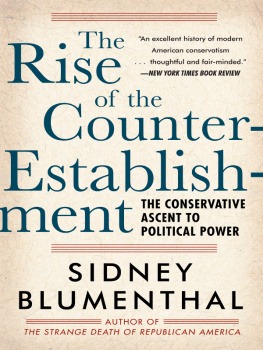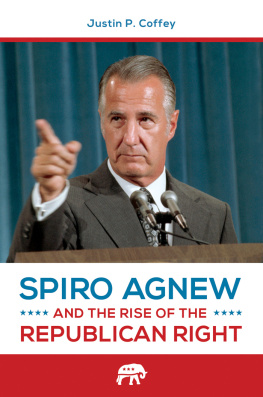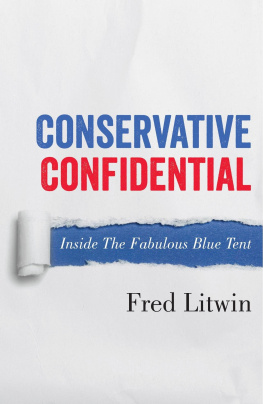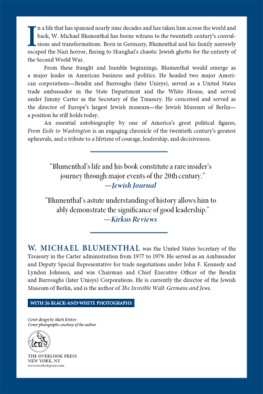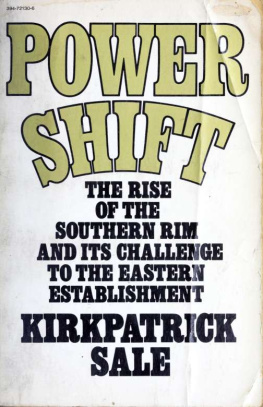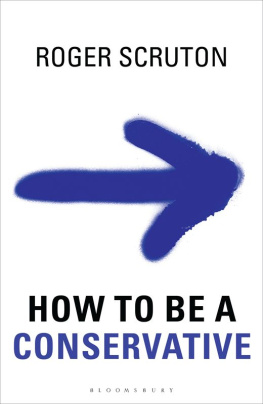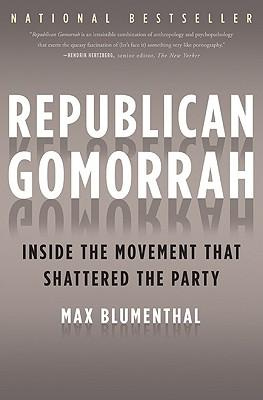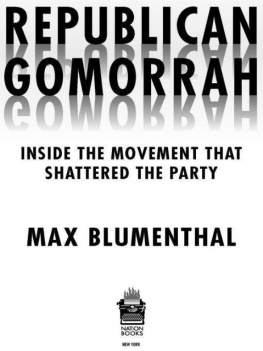Blumenthal - The rise of the counter-establishment: the conservative ascent to political power
Here you can read online Blumenthal - The rise of the counter-establishment: the conservative ascent to political power full text of the book (entire story) in english for free. Download pdf and epub, get meaning, cover and reviews about this ebook. City: New York;United States, year: 2008;2011, publisher: Sterling;Union Square Press, genre: Politics. Description of the work, (preface) as well as reviews are available. Best literature library LitArk.com created for fans of good reading and offers a wide selection of genres:
Romance novel
Science fiction
Adventure
Detective
Science
History
Home and family
Prose
Art
Politics
Computer
Non-fiction
Religion
Business
Children
Humor
Choose a favorite category and find really read worthwhile books. Enjoy immersion in the world of imagination, feel the emotions of the characters or learn something new for yourself, make an fascinating discovery.
- Book:The rise of the counter-establishment: the conservative ascent to political power
- Author:
- Publisher:Sterling;Union Square Press
- Genre:
- Year:2008;2011
- City:New York;United States
- Rating:4 / 5
- Favourites:Add to favourites
- Your mark:
- 80
- 1
- 2
- 3
- 4
- 5
The rise of the counter-establishment: the conservative ascent to political power: summary, description and annotation
We offer to read an annotation, description, summary or preface (depends on what the author of the book "The rise of the counter-establishment: the conservative ascent to political power" wrote himself). If you haven't found the necessary information about the book — write in the comments, we will try to find it.
The rise of the counter-establishment: the conservative ascent to political power — read online for free the complete book (whole text) full work
Below is the text of the book, divided by pages. System saving the place of the last page read, allows you to conveniently read the book "The rise of the counter-establishment: the conservative ascent to political power" online for free, without having to search again every time where you left off. Put a bookmark, and you can go to the page where you finished reading at any time.
Font size:
Interval:
Bookmark:

Praise for Sidney Blumenthals
The Rise of the Counter-Establishment
We have long needed an anatomy of Reaganism as an intellectual movement, and at last Sidney Blumenthal has filled the gap in this incisive,
illuminating and enlivening work. Arthur Schlesinger, Jr.
An excellent history of modern American conservatismthis is a
thoughtful and fair-minded book. New York Times Book Review
Skillful, extensively researched and unfailingly interestingThe people and institutions Blumenthal so skillfully and intelligently describes have
had an incalculable impact on public life. Boston Sunday Globe
It makes a substantial contribution to our understanding
of the Reagan presidency. Dallas Times Herald
Blumenthal brings new insight to a fundamental transformation of
American politics. Library Journal
Also by Sidney Blumenthal
The Permanent Campaign (1980)
The Reagan Legacy (coeditor with Thomas Byrne Edsall) (1988)
Our Long National Daydream: A Political Pageant of the Reagan Era (1988)
Pledging Allegiance: The Last Campaign of the Cold War (1991)
The Clinton Wars (2003)
How Bush Rules: Chronicles of a Radical Regime (2006)
The Strange Death of Republican America: Chronicles of a Collapsing Party (2008)
The
Rise
of the
Counter-
Establishment
THE CONSERVATIVE ASCENT
TO POLITICAL POWER
SIDNEY BLUMENTHAL

Grateful acknowledgment is made to the following for permission to reprint previously published material:
The Boston Globe: Excerpts from articles by Sidney Blumenthal from The Boston Globe Sunday Magazine. Reprinted courtesy of The Boston Globe.
The Washington Post: Excerpts from articles by Sidney Blumenthal from The Washington Post. Copyright by The Washington Post. Reprinted by permission.
The New York Times: David Stockman: The Presidents Cutting Edge, by Sidney Blumenthal from The New York Times Magazine, March 15, 1981. Whose Side Is Business On Anyway, by Sidney Blumenthal from The New York Times Magazine, October 25, 1981. Copyright 1981 by the New York Times Company. Reprinted by permission. All rights reserved.
Storm King Music, Inc.: Excerpt from Which Side Are You On, by Florence Reece. Copyright 1947 by Storm King Music, Inc. All rights reserved. Used by permission.
A hardcover edition of this book was published in 1986 by Times Books, a division of Random House, Inc. It is here reprinted by arrangement with Times Books.

STERLING and the distinctive Sterling logo are registered trademarks of Sterling Publishing Co., Inc.
Library of Congress Cataloging-in-Publication Data
Blumenthal, Sidney, 1948
The rise of the counter-establishment : the conservative ascent to political power / Sidney Blumenthal.
p. cm.
A hardcover edition of this book was published in 1986 by Times Books.
Includes a new introduction. Includes bibliographical references and index.
ISBN-13: 978-1-4027-5911-6
ISBN-10: 1-4027-5911-8
1. Conservatism--United States. 2. Elite (Social sciences)--United States.
3. United States--Politics and government--1981-1989. I. Title.
JA84.U5B54 2008
320.520973--dc22
2007047789
All rights reserved
Sterling ISBN 9781402792090
For information about custom editions, special sales, premium and corporate purchases, please contact Sterling Special Sales Department at 800-805-5489 or specialsales@sterlingpublishing.com.
For My Parents
CONTENTS
Preface to the 2008 Edition
The Hidden History of Neoconservatism:
From Dick Cheney to Dick Cheney
INTRODUCTION
Shadow Liberalism
CHAPTER ONE
The Conservative Remnant
CHAPTER TWO
The Business of Intellectuals
CHAPTER THREE
The Business of America
CHAPTER FOUR
The Romance of the Market
CHAPTER FIVE
Capitalism and Friedman
CHAPTER SIX
Shadow Leftism, or the
Ideological Light Brigade
CHAPTER SEVEN
A Lost Continent
CHAPTER EIGHT
The Protestant Ethic
CHAPTER NINE
The Mythology of Reaganism
CHAPTER TEN
The Will to Believe
CHAPTER ELEVEN
Morning Again
CHAPTER TWELVE
The Second Coming
CHAPTER THIRTEEN
The Beginning of Ideology
PREFACE TO THE 2008 EDITION The Hidden History of Neoconservatism:
From Dick Cheney to Dick Cheney
After Dick Cheney shot a friend in the face on a Texas hunting trip in February 2006, the national press corps began to speculate about him as one of the great mysteries of Washington, the Sphinx of the Naval Observatory, his official residence. Cheney had been known in the capital for decades through a career that carried him from congressional intern to the most powerful vice president in American history, but now his supposedly changed character became a subject of intense speculation. Brent Scowcroft, who had been George H.W. Bushs national security adviser, and had counseled against the invasion of Iraq, told The New Yorker magazine in 2005, I consider Cheney a good friendIve known him for thirty years. But Dick Cheney I dont know anymore.
In 2000, when Cheney, as head of George W. Bushs search committee for a running mate, selected himself, opinion makers in Washington greeted the choice as proof positive of the younger Bushs deference to wisdom and therefore personifying prudence. Cheneys manner gives him immunity from the extremist label, assured David Broder, the longtime leading political columnist of the Washington Post. Voters who saw his televised briefings during the Persian Gulf War remember the calm voice and thoughtful expression that are his natural style.... By choosing a grownup, Bush gave evidence of his own sense of responsibility.
Five years later, in 2005, Colonel Lawrence Wilkerson, by then the former chief of staff to the former Secretary of State Colin Powell, speaking publicly at a Washington think tank, the New America Foundation, was less concerned with the press corps obsession with Cheneys shifting images than with exposing his unprecedented manipulations. What I saw was a cabal between the vice president of the United States, Richard Cheney, and the secretary of defense, Donald Rumsfeld, on critical issues that made decisions that the bureaucracy did not know were being made. Though he had had extensive experience in government, Wilkerson had never before encountered such secrecy, aberration, and bastardization in decision-making. It is a dysfunctional process, he said. And to myself I said, okay, put on your academic hat. Whos causing this?
Previously fixed on the stereotype of the grown-up, pundits projected a new stereotype of dementia. But had Cheney, in fact, been fundamentally transformed, becoming unrecognizable to those professional observers of the press who believed they knew him well? Both Scowcroft and Wilkerson had encountered Cheney within councils of state. Had even Scowcroft misjudged Cheney as a team player when he was Secretary of Defense during the Gulf War? Was Cheney a regular, conservative-minded Republican who had just gone mad? Or, if he was a member of a cabal, did it involve more than Rumsfeld?
George W. Bush jettisoned the tenets of traditional Republicanism fiscal responsibility, limited government, separation of church and state, and realism in foreign policy. Instead the doctrines that had been nurtured in the hothouse of the Counter-Establishment since the Reagan period achieved their most radical expression. At every point, Cheney exercised his power.
Next pageFont size:
Interval:
Bookmark:
Similar books «The rise of the counter-establishment: the conservative ascent to political power»
Look at similar books to The rise of the counter-establishment: the conservative ascent to political power. We have selected literature similar in name and meaning in the hope of providing readers with more options to find new, interesting, not yet read works.
Discussion, reviews of the book The rise of the counter-establishment: the conservative ascent to political power and just readers' own opinions. Leave your comments, write what you think about the work, its meaning or the main characters. Specify what exactly you liked and what you didn't like, and why you think so.

